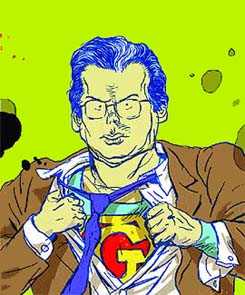
Baltasar Garzon woont in Den Haag, hij is onlangs gespot door een vriendin van de lieve G. Of hij helemaal vrijwillig in Den Haag woont is de vraag. Hij werkt bij het internationaal gerechtshof, maar in The New York Times lees ik dat hij in eigen land wordt vervolgt wegens het omzeilen van de amnesty wet van 1977. Die wet was bedoelt om niet al te gevoelige wonden open te krabben en de transitie naar democratie goed te laten verlopen. Hij opende massagraven uit het Franco tijdperk met de bedoeling wandaden van destijds alsnog aan de kaak te stellen.De amnesty wet omzeilde hij met de mededeling dat wandaden tegen de menselijkheid niet kunnen verjaren. Inmiddels hebben ultra rechtse groepen hem met succes aangeklaagd. Het is alsof Franco zoveel jaar over zijn graf heen nogsteeds de touwtjes in handen heeft.
Dit stond er in de Times:
'He rightly counters that under international law, there can be no amnesty for crimes against humanity and that unsolved disappearances — thousands of mass graves are unopened — constitute a continuing crime.In 2008, Judge Garzón briefly began an official inquiry, ordering the opening of 19 mass graves and symbolically indicting Gen. Francisco Franco and several former officials, none still alive, for the disappearance of more than 100,000 people. An appellate court shut the inquiry down. The next year, two far-right groups brought criminal charges against the judge for defying the amnesty law. The government’s prosecutor argued that no crime had been committed, but the Supreme Court accepted the case.
Separately, Judge Garzón faces criminal charges for rulings in two other
politically charged cases. We cannot judge the merits of these. But
criminal prosecution of magistrates for their rulings is rare in Spain,
and could chill judicial independence.
Judge Garzón became famous for his prosecutions of Basque terrorists,
Argentine torturers, Chile’s former dictator, Gen. Augusto Pinochet, and
Spanish politicians. His powerful enemies now see a chance to end his
career.
Judge Garzón is undeniably flamboyant and at times overreaches, but
prosecuting him for digging into Franco-era crimes is an offense against
justice and history. The Spanish Supreme Court never should have
accepted this case. Now it must acquit him.'
Het rechtswezen blijft een kwestie van interpretatie. Garzon mag soms te ver reiken in zijn beschuldigingen, zijn intenties hebben vooralsnog als doel een dominante visie uit het verleden in retroperspectief als onrechtmatig te bestempelen. Dat is op zijn minst voor de geschiedschrijving nuttig. Het is een strijd om de geschiedenisboeken. Ondanks het overweldigende bewijs van de massagraven, denken sommigen dat diegene die het graven heeft bevolen de schuldige is. Dat is ook zo, maar diegene stierf in 1975 en heette Fransisco Franco.
